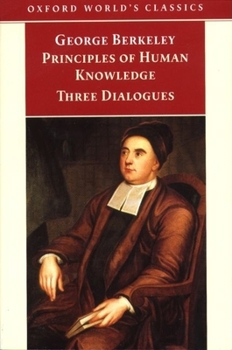Principles of Human Knowledge and Three Dialogues
Select Format
Select Condition 
Book Overview
Berkeley's idealism started a revolution in philosophy. As one of the great empiricist thinkers he not only influenced British philosophers from Hume to Russell and the logical positivists in the twentieth-century, he also set the scene for the continental idealism of Hegel and even the philosophy of Marx. This edition of Berkeley's two key works has an introduction which examines and in part defends his arguments for idealism, as well as offering...
Format:Paperback
Language:English
ISBN:0192835491
ISBN13:9780192835499
Release Date:June 1999
Publisher:Oxford University Press, USA
Length:288 Pages
Weight:0.45 lbs.
Dimensions:0.6" x 7.6" x 5.1"
Related Subjects
African-American Studies Biological Sciences Biology & Life Sciences Botany English Literature Epistemology Essays Essays & Correspondence History & Surveys Literary Literary Criticism Literary Criticism & Collections Literature Literature & Fiction Metaphysics Philosophy Politics & Social Sciences Social Sciences Specific Demographics TextbooksCustomer Reviews
3 ratings
Excellent edition
Published by Thriftbooks.com User , 17 years ago
The main text of any edition of Principles/Three Dialogues will be virtually the same, but this one is especially good for its superb introduction, by Roger Woolhouse. I can't imagine that there is anywhere a better short introduction to Berkeley's thought, the issues that motivated his work, and where he fits into the history of philosophy both before and after his time. Berkeley really was a radical thinker, following the premises of others, like Descartes and Locke, to their logical, and deeply troubling, implications. He was out to defeat skepticism, which he saw as corrosive of religion, yet ended up a primary representative of the skeptical view. As Woolhouse points out, modern phenomenalism can find roots in Berkeley, and perhaps even the logical empiricism of the Vienna Circle. If someone were just starting out reading Western philosophy and wondered where to begin, I would recommend Berkeley as the best place to start.
Immaterialism and Common Sense
Published by Thriftbooks.com User , 22 years ago
George Berkeley's early 18th century treatise "Of the Principles of Human Knowledge" was written in response to the current popular philosophical leanings of Locke, Descartes, Hobbes, Malebranche, and others. Berkeley's major problem with the philosophy of his age was in its materialist leanings. Berkeley at base had issues with the indefinite nature of philosophical terminology, and the ways in which the foundations of knowledge seemed to be centered on unknowable concepts like 'abstract truths,' 'matter,' and 'absolute' entities. The solution? Berkeley reasons that philosophy has gotten away from common sense, and that the way to make philosophy and natural science more accessible is to use the vocabulary and understanding of the 'vulgar' masses. Berkeley's philosophy is called Immaterialism. He holds that the only things that can properly be said to exist are 'ideas' and 'spirits.' Ideas are all objects perceived by our five senses or by logic and inference from those objects. Spirits are our minds or souls, those things that perceive, think, and exercise will. He says that all other philosophical terminology only tends to confuse us. We cannot doubt the real existence of anything in the world, because we see, feel, hear, touch, and taste these things every day. What we can doubt are philosophical quandaries like abstract ideas - for existence, while we can think of a particular person in motion, we can neither conceive of a person in abstract nor of motion in general. This, Berkeley contends, is all that common sense gives to the plainest of people. Ordinary people do not doubt the existence of trees or gloves, nor do they conjecture about matter or substrata underlying the things they interact with everyday. The 'Three Dialogues between Hylas and Philonous' serve to support the philosophical arguments that Berkeley made in the 'Principles.' Hylas is a materialist, while Philonous represents Berkeley's immaterialist argument. Their three dialogues are extremely entertaining and informative. They compliment the technical philosophy by providing concrete examples, which are many times missing from Berkeley's treatise. While the treatise and the dialogues can be read and understood on their own, the fullest appreciation of Berkelely comes from reading both. One limitation of Berkeley is that his 'vulgar' notions are almost too simplistic. He takes Occom's razor almost to the point of absurdity, which causes him to dispute notions like gravity, which these days one may well frown upon. Other than matters of advanced mathematical or scientific complexity, however, Berkeley's immaterialism seems, on the surface, to make great sense. Another interesting facet of these two works is their religious component. An Anglican bishop, Berkeley makes use of his belief in God both to support his arguments, and uses immaterialist arguments to simply (far more simply than Descartes) prove the existence of God. Not quite an enthralling read, but, who reads philo
Esse est percipi aut percipere
Published by Thriftbooks.com User , 24 years ago
Berkeley's principle, esse est percipi aut percipere, denies the bustance's existence and assents that all things are only minds or ideas perceived by minds. This is the starting point for the idealism and all this is exposed in his first work, the "Principles of human knowledge" (1710). Since his first work was met with disfavour, he resposed to his critics with his second work, the "Three dialogues" between Hylas and Philonous (1713). This edition contains the two keys works and also has an introduction wich examines Berkeley's arguments.





